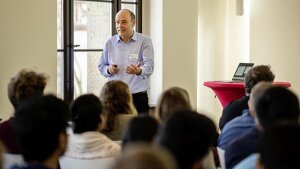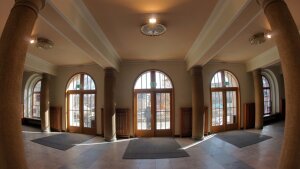Overview
Prof. Ulf Peschel.
Image: Anna SchrollThe Master of Science in Physics (M. Sc. Physics) is based on the long-standing physics teaching tradition provided by the Faculty of Physics and Astronomy at the Friedrich Schiller University Jena. The Master's course is primarily designed for students who have already finished their Bachelor of Science in Physics. Anybody who has successfully completed such a Bachelor at a German university or at a university in an EU country will be accepted for the Master of Science in Physics without reseservation to the consecutive program of study. The acceptance of applicants from other institutions and other fields of study is decided individually.
The M. Sc. Physics is fully taught in the English language to ease the adaption to foreign students. Thus, it requires proficiency in the English language.
Graduating as a physicist from Jena is internationally recognized as a high-quality benchmark. For many decades, successful graduates have approved of the most excellent career opportunities on the German and international labor markets, including leading positions in industry, academia and public service.
Key facts
Entrance hall of the Faculty of Physics and Astronomy in Jena.
Image: Jan-Peter Kasper (University of Jena)All students who are enrolled in the M.Sc. Physics program can choose among different elective modules and topics for their Master's degree thesis. Building on the broad range of modules offered by the experienced teaching staff of the Abbe School of Photonics (ASP), they have the opportunity to specialize particularly in optics and photonics. All elective modules offered by the ASP are fully compatible with the M.Sc. Physics study course and may be chosen.
The Master's degree program is based on many years of experience in optics education provided by the Faculty of Physics and Astronomy of the Friedrich Schiller University Jena. Our university deems optics and photonics as one of its primary fields in education and research. A significant benefit of the program is its embedding in the modern research environment of the Abbe Center of Photonics (ACP), integrating 13 institutes of the Friedrich Schiller University Jena, the Fraunhofer Institute for Applied Optics and Precision EngineeringExternal link, the Leibniz Institute of Photonic TechnologyExternal link, the Helmholtz-Institute Jena,External linkand a number of prominent industrial partners.
The Master's degree program is part of a comprehensive education program provided by the Faculty of Physics and Astronomy at the Friedrich Schiller University Jena. Successful graduates are optimally prepared to be accepted as doctoral candidates, either within ASP's doctoral program or within individual physics doctorates at the University.
Study program and application
Nonlinear optics laboratory.
Image: Jan-Peter Kasper (University of Jena)The up-to-date module catalogue is available for download here de. General information on the Master's Degree in Physics program is available here de.
International studies for outgoing German students
Erasmus+ program
Image: Compassionate Eye Foundation/Graham WinterbottomOnce enrolled, German students have the chance to spend up to one year of their studies abroad. The Faculty of Physics and Astronomy sustains a large network of reputable partner universities all over Europe that offer various study slots for both M.Sc. Photonics and M.Sc. Physics students. These exchanges are coordinated by Prof.Malte Kaluza via the Erasmus+ program. Erasmus stays abroad are financially supported by EU fellowships.
Please find more details on ASP's international exchange programs for Master's degree students here.


